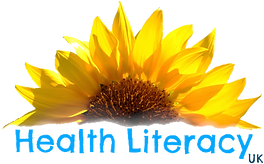What is health literacy?
Health literacy can be defined as ‘the personal characteristics and social resources needed for individuals and communities to access, understand, appraise and use information and services to make decisions about health.’(WHO, 2015)
How big a problem is health literacy?
We know that levels of functional health literacy are low in England. Health information in current circulation is written at too complex a level for 43% of working age adults (16-65 years); this figure rises to 61% if the health information includes numeracy. We do not know how many people are additionally burdened by low interactive and critical health literacy skills but numbers are likely to be even higher.
We also know that low health literacy has real effects on health and illness. In England, older people with low health literacy have higher mortality. Research from the US and Europe shows people with low health literacy are more likely to have a long-term health condition and this is more likely to limit their activities. People with low health literacy rate their health as lower than people with higher health literacy levels; people with low health literacy and lower educational levels are more likely to have unhealthy lifestyles.
Health literacy is a social determinant of health and is strongly linked with other social determinants such as poverty, unemployment and membership of a minority ethnic group. Where health literacy differs from these other social factors is that it is, potentially, open to change through improving health systems and building patient and public awareness and skills.
